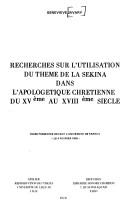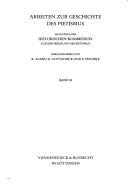| Listing 1 - 10 of 31 | << page >> |
Sort by
|
Book
ISBN: 2220021602 9782220021607 Year: 1978 Publisher: [Lieu de publication inconnu]: Desclée De Brouwer,
Abstract | Keywords | Export | Availability | Bookmark
 Loading...
Loading...Choose an application
- Reference Manager
- EndNote
- RefWorks (Direct export to RefWorks)
Presence of God --- Spiritual life --- Catholic Church --- God --- Schechinah --- Shechina --- Shechinah --- Shekhinah --- Shekina --- Shekinah --- Catholic authors --- Presence --- Omnipresence --- Spiritual life - Catholic Church
Book
ISBN: 9788878393172 8878393177 Year: 2015 Volume: 214 Publisher: Roma: Pontificia Università Gregoriana,
Abstract | Keywords | Export | Availability | Bookmark
 Loading...
Loading...Choose an application
- Reference Manager
- EndNote
- RefWorks (Direct export to RefWorks)
Presence of God --- 226.2 --- 221.05*1 --- God --- Schechinah --- Shechina --- Shechinah --- Shekhinah --- Shekina --- Shekinah --- Biblical teaching. --- Evangelie volgens Matteüs --- Targum --- Presence --- Omnipresence --- 221.05*1 Targum --- Biblical teaching
Book
ISBN: 3161546172 9783161546174 Year: 2016 Volume: 367 Publisher: Tübingen: Mohr Siebeck,
Abstract | Keywords | Export | Availability | Bookmark
 Loading...
Loading...Choose an application
- Reference Manager
- EndNote
- RefWorks (Direct export to RefWorks)
Presence of God --- God (Christianity) --- 225.08*01 --- 225.08*01 Theologie van het Nieuwe Testament: God (Godsleer) --- Theologie van het Nieuwe Testament: God (Godsleer) --- Christianity --- Trinity --- God --- Schechinah --- Shechina --- Shechinah --- Shekhinah --- Shekina --- Shekinah --- Omnipresence --- Presence
Book
ISBN: 1009269704 1009269690 1009269682 1009269712 Year: 2022 Publisher: Cambridge, United Kingdom ; New York, NY, USA : Cambridge University Press,
Abstract | Keywords | Export | Availability | Bookmark
 Loading...
Loading...Choose an application
- Reference Manager
- EndNote
- RefWorks (Direct export to RefWorks)
If God exists and is perfectly good, God tries to guide people. A twofold question then arises: How does God (try to) guide people, and to what end? Problems of divine guidance for humans, according to this volume, are real and serious, but they are manageable once we clarify the kind of God at issue. According to the volume's main thesis, if God has a perfect moral character accompanied by certain redemptive purposes for humans, the puzzling nature of divine guidance for them need not preclude the reality of such guidance. It is, this volume contends, a live option for God to guide or lead humans toward goodness, even if the leading is not fully explainable by humans. The voluntary moral attraction of cooperative humans by divine goodness is central to divine guidance, and it can illuminate the kind of evidence to be expected from God.
Discernment (Christian theology) --- God (Christianity) --- Cognitive dissonance --- Presence of God. --- Will. --- Religious aspects. --- God --- Schechinah --- Shechina --- Shechinah --- Shekhinah --- Shekina --- Shekinah --- Dissonance (Psychology) --- Change (Psychology) --- Cognition --- Motivation (Psychology) --- Selectivity (Psychology) --- Will --- Christian life --- Presence --- Omnipresence
Book
ISBN: 3290171353 Year: 1988 Volume: vol 135 Publisher: Zürich Theologischer Verlag
Abstract | Keywords | Export | Availability | Bookmark
 Loading...
Loading...Choose an application
- Reference Manager
- EndNote
- RefWorks (Direct export to RefWorks)
Aanwezigheid van God --- Dieu --- Dieu--Présence --- God --- God--Aanwezigheid --- God--Presence --- Presence of God --- Présence divine --- 276 =71 AUGUSTINUS:1 --- #GOSA:II.P.AU.3 --- Latijnse patrologie-:-Filosofie. Psychologie--AUGUSTINUS --- Schechinah --- Shechina --- Shechinah --- Shekhinah --- Shekina --- Shekinah --- History of doctrines --- Presence --- Omnipresence --- Augustine, --- Augustine

ISBN: 2729500758 9782729500757 Year: 1978 Publisher: Paris: Champion,
Abstract | Keywords | Export | Availability | Bookmark
 Loading...
Loading...Choose an application
- Reference Manager
- EndNote
- RefWorks (Direct export to RefWorks)
Presence of God --- Glory of God --- Apologetics --- History of doctrines --- Christianity --- History --- -God --- Schechinah --- Shechina --- Shechinah --- Shekhinah --- Shekina --- Shekinah --- God --- Presence --- Omnipresence --- Theses --- History of doctrines. --- History. --- -History of doctrines --- Divine glory --- Glorification (Theology) --- Glory, Divine --- God, Glory of --- Christianity&delete& --- Glory --- Presence of God - History of doctrines --- Glory of God - Christianity - History of doctrines --- Apologetics - History
Book
ISBN: 9782204125727 2204125725 Year: 2017 Publisher: Paris: Cerf,
Abstract | Keywords | Export | Availability | Bookmark
 Loading...
Loading...Choose an application
- Reference Manager
- EndNote
- RefWorks (Direct export to RefWorks)
Catholiques et orthodoxes se revendiquent ensemble du concile Constantinople III qui affirme " une énergie divine et une énergie humaine " pour le Christ, refusant le monoénergisme théandrique. Pourtant, des catholiques (thomasiens) défendent une simplicité divine, une grâce créée et une vision de Dieu alors que des orthodoxes (palamites) soutiennent une distinction réelle entre essence et énergie en Dieu, une énergie incréée et un Dieu inconnaissable. L'examen des divergences ne permet-il de voir des convergences ? Dans l'Ecriture, si l'énergie se rapporte souvent à une opération de Dieu, elle est aussi l'énergie de l'homme et des éléments de la nature, incréée et créée. La théologie des énergies divines n'est-elle pas aussi une théologie des énergies humaines et cosmiques ? L'examen et la comparaison de l'énergie chez Aristote et de l'énergie chez Plotin permettent de saisir des divergences. Avec le Stagirite, nous avons une analogie des énergies physique, biologique, sensible, intellectuelle, éthique et théologique. L'Un plotinien conduit la foi chrétienne à toujours plus d'équivocité et d'altérité, selon une forme de monoénergisme divin. Méditer et articuler les différentes présences de Dieu (création, grâce et incarnation) peut aider à saisir les convergences. Les Latins pourraient reconnaître qu'ils ont besoin d'une théologie des énergies qui ne peut pas se réduire à l'acte et à la substance, car l'actus latin, statique, juridique et théâtral n'est pas l'energeia grec, dynamique, physique et éthique. Les Grecs peuvent saisir que cette théologie des énergies doit prendre des accents aristotéliciens, à la suite de saint Maxime le confesseur, au-delà de Plotin et du néoplatonisme.
God (Christianity) --- Philosophical theology --- Philosophy and religion --- Presence of God --- History of doctrines --- Theology, Philosophical --- God --- Schechinah --- Shechina --- Shechinah --- Shekhinah --- Shekina --- Shekinah --- Christianity and philosophy --- Religion and philosophy --- Presence --- Theology, Doctrinal --- Religion --- Omnipresence --- 231.12 --- 231.13 --- 231.13 Eigenschappen van God --- Eigenschappen van God --- 231.12 Wezen van God --- Wezen van God
Book
ISBN: 9789042922952 9042922958 Year: 2010 Volume: 23 Publisher: Leuven: Peeters,
Abstract | Keywords | Export | Availability | Bookmark
 Loading...
Loading...Choose an application
- Reference Manager
- EndNote
- RefWorks (Direct export to RefWorks)
During the long and impressive career of prof. Lambert Leijssen interesting ideas about sacraments, liturgy, pastoral theology, and spirituality were crystallized. It would be sad if the generations after prof. Leijssen would not be concerned anymore about these ideas. Therefore, the contributions in this book in one way or another reflect prof. Leijssen's major theological concerns. They have been taken up in three parts. In the first part, Louis-Marie Chauvet, Jean-Yves Lacoste, George S. Wogul, and Paul Post engage themselves in thoroughgoing fundamental reflections on the sacraments and the liturgy. The second part consists of four contributions dealing with individual sacraments. Jozef Lamberts, Joris Geldhof, Stijn Van den Bossche, and Thomas Knieps-Port le Roi respectively dwell on the sacraments of initiation, the Eucharist, and marriage. The third part contains reflections on the crossroads of sacramental theology, moral theology, and pastoral theology. André Haquin, Susan K. Roll, Annemie Dillen, and Marcel Broesterhuizen show in a very leijssenian way that sacraments always point to concrete life situations. By way of introduction to this volume, Matthijs Lamberigts' laudatio pronounced at the solemn celebration of prof. Leijssen's retirement has also been included.
Sacraments. --- Presence of God. --- Liturgics. --- Leijssen, Lambert. --- Liturgics --- Presence of God --- Sacraments --- Academic collection --- 264 <082> --- 265 --- Ecclesiastical rites and ceremonies --- Church --- Grace (Theology) --- Rites and ceremonies --- God --- Schechinah --- Shechina --- Shechinah --- Shekhinah --- Shekina --- Shekinah --- Liturgiology --- Liturgy --- Public worship --- Liturgies --- 264 <082> Liturgie--Feestbundels. Festschriften --- Liturgie--Feestbundels. Festschriften --- Sacramenten:--algemeen --- Presence --- Omnipresence --- Leijssen, Lambert --- Festschrift - Libri Amicorum

ISBN: 3525558082 3666558089 Year: 1986 Volume: Bd. 24 Publisher: Göttingen
Abstract | Keywords | Export | Availability | Bookmark
 Loading...
Loading...Choose an application
- Reference Manager
- EndNote
- RefWorks (Direct export to RefWorks)
Presence of God --- 284.1 <43> "17" --- 284.1 <43> "17" Lutheraanse hervorming. Reformatie van Luther--Duitsland voor 1945 en na 1989--18e eeuw. Periode 1700-1799 --- Lutheraanse hervorming. Reformatie van Luther--Duitsland voor 1945 en na 1989--18e eeuw. Periode 1700-1799 --- God --- Schechinah --- Shechina --- Shechinah --- Shekhinah --- Shekina --- Shekinah --- History of doctrines --- Presence --- Omnipresence --- Tersteegen, Gerhard, --- Teerstegen, Gerhard, --- Tersteegen, Gerhard
Book
ISBN: 9789004462199 9789004462182 900446218X 9004462198 Year: 2021 Publisher: Leiden, The Netherlands ; Boston : Brill,
Abstract | Keywords | Export | Availability | Bookmark
 Loading...
Loading...Choose an application
- Reference Manager
- EndNote
- RefWorks (Direct export to RefWorks)
In The Feminine Messiah: King David in the Image of the Shekhina in Kabbalistic Literature , Ruth Kara-Ivanov Kaniel presents an in-depth study focusing on the centrality of the figure of King David in Jewish culture and mystical literature. King David is one of the most colorful, complex, and controversial personalities in Jewish lore. While numerous studies have focused on David's centrality to biblical literature and late antiquity, to date no comprehensive scholarly attempt has been made to investigate his image in Jewish kabbalistic literature. This innovative study also contributes to the understanding of the connection between the mystical and psychoanalytic perception of the self, as well as illuminating issues of gender fluidity, identity, and sexuality in medieval kabbalistic literature.
Cabala --- Presence of God --- God --- Schechinah --- Shechina --- Shechinah --- Shekhinah --- Shekina --- Shekinah --- Cabbala --- Jews --- Kábala --- Kabalah --- Kabbala --- Kabbalah --- Qabalah --- Jewish literature --- Magic --- Mysticism --- Presence --- Omnipresence --- Judaism --- David, --- Daud, --- Dāwūd, --- Nabī Dāwūd, --- דוד --- דוד, --- דוד המלך --- David (Biblical figure) --- 296*41 --- 221-05 --- 221-05 Personen in het Oude Testament --- Personen in het Oude Testament --- 296*41 Kabbala --- Presence of God.
| Listing 1 - 10 of 31 | << page >> |
Sort by
|

 Search
Search Feedback
Feedback About UniCat
About UniCat  Help
Help News
News